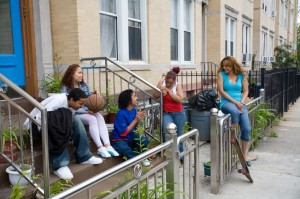Partners
Within The Access Point network, there are more than 50 service provider partners involved in the network who accept applications for vacancies via The Access Point. These partners are listed below: 
- Across Boundaries
- Alternatives
- Black Creek Community Health Centre
- Breakaway
- Canadian Mental Health Association Toronto
- Central Toronto Youth Services
- Centre for Addiction and Mental Health
- Centre Francophone de Toronto
- City of Toronto
- CommunitiCare Health Services
- Cota
- Eden Community Homes
- Fife House
- Fred Victor
- Friends of Ruby
- George Herman House
- Gerstein Crisis Centre
- Good Shepherd Non-Profit Homes
- Habitat Services
- HF Care – Asian Mental Health and Well-Being (Cantonese, Mandarin, Korean, Cambodian & Vietnamese)
- House of Compassion
- Humber River Health
- John Howard Society
- LOFT Community Services
- Lumenus Mental Health, Developmental & Community Services
- Madison Community Services
- Margaret’s Housing & Community Support Services
- Michael Garron Hospital
- Mid-West Toronto Ontario Health Team
- Mt. Sinai Hospital
- Neighbours Community Homes
- North York General Hospital
- Ontario Shores
- Parkdale Activity-Recreation Centre – PARC
- Pilot Place Society
- Progress Place
- Reconnect Community Health Services
- Reena – Chai Tikvah
- Scarborough Centre for Healthy Communities (SCHC)
- Scarborough Health Network
- Senior Persons Living Connected (SPLC)
- Sound Times
- St. Joseph’s Health Centre
- St. Jude Community Homes
- St. Michael’s Homes
- St. Michael’s Hospital
- Street Haven at the Crossroads
- Sunnybrook Hospital
- TAIBU
- The Jean Tweed Centre
- The Neighbourhood Group
- Toronto Community Addictions Team – TCAT
- Toronto Seniors Helpline
- University Health Network
- West Community Connect
- West Neighbourhood House
- WoodGreen
- YWCA Toronto
The Access Point also has strong ties with other networks within the Mental Health and Addiction Sector. Some of the service providers in these other networks, are also part of The Access Point network. Below are descriptions of these other networks:
Toronto Early Psychosis Intervention Programs
The Early Psychosis Intervention programs provide services to individuals experiencing the early signs and symptoms of psychosis, which may include the following:
- Trouble concentrating and thinking clearly
- Withdrawing from friends and family
- Being suspicious of others
- Confusion about what is real or imaginary
- Unusual or unexplained changes in behaviour
- Hallucinations (hearing voices, seeing things that are not there)
These programs help with early identification and treatment of psychosis to reduce the impact of psychosis on all areas of a young person’s life. Early Psychosis Intervention Programs are generally for individuals 14-34 years of age having their first psychosis who have experienced less than one year of adequate treatment. Early Psychosis Intervention programs are usually up to 3 years of service where then the individual would be referred to other types of services if needed. Some of the organizations below target specific ethno-cultural groups for their program.
The organizations that form this group of programs are:
- Fred Victor – Culturally Oriented Early Intervention Program
- St. Michael’s Hospital – Starting Treatment Early for Psychosis Services (STEPS)
- Central Toronto Youth Services (CTYS) – Early Intervention Program
- Centre for Addiction and Mental Health (CAMH) – Early Intervention Clinic and First Episode Psychosis Clinics*
- CMHA Toronto – Early Psychosis Intervention Program (MOD Team)
- University Health Network – Asian Initiative in Mental Health Intervention in Psychosis Program (AIM EIP)*
- Rouge Valley Health Systems – First Intervention Treatment Team (FITT)
- Humber River Hospital – Early Intervention Program
* = programs where the age range is 16-45 years
Problematic Substance Use Program
The goal of this initiative is to increase the health and social outcomes of people with problematic substance use who are frequent users of the addiction treatment system and emergency services by providing stable housing and appropriate support services. The program is based on the Housing First model, which provides supportive housing to people without requirements for engagement in addiction treatment or abstinence. The organizations that form the Problematic Substance Use Program are:
- Breakaway
- Fife House
- Fred Victor
- Good Shepherd Non-Profit Homes
- The Jean Tweed Centre
- LOFT Community Services
- Neighbours Community Homes
- CommunitiCare Health Services
- The Neighbourhood Group
- John Howard Society
- CAMH Drug Treatment Court
- Community Outreach Programs in Addictions (COPA)
 Target Groups
Target Groups
Several of these service providers partnerships have specific target groups they serve.
| Organization(s) | Target Group |
| The Jean Tweed Centre / Mainstay Housing | Women and women with children |
| Fred Victor | Homeless MDOT clients |
| LOFT Community Services / Fife House | People living with HIV/AIDS |
| Toronto Community Addictions Team (TCAT) | Frequent Emergency Department and/or Withdrawl Management System users |
| CAMH/Neighbours Community Homes | Men and women, actively involved within the criminal justice system choosing treatment as alternative to incarceration |
| CAMH/John Howard Society | Housing for men leaving jail, who have plead guilty to a drug-related offence. Participate in Toronto Drug Treatment Court for minimum of 1 year. |
| COPA/Mainstay | Older adults (+55) with addictions issues and complex care needs |
Application Process
Individuals may apply by completing The Access Point online application form, which is available on this website.
Eligibility Criteria
- Severity of Substance Use: The individual must have a severe and active substance use challenge.*Nicotine dependence, gambling and other forms of addiction are not sufficient for qualification for this program.*
- Current Housing: The individual must be homeless or marginally housed.*
*marginally housed is defined as overcrowding (including Rooming Houses), or persons paying significantly more than their housing portion of social assistance.
- Income and Status in Canada/ Ontario: The individual must qualify for a housing subsidy under the criteria set by the Ministry of Health.
- Over 16 years of age
- Be a resident of Ontario and not have a principal residence elsewhere.
- Permanent resident or refugee claimant in Canada
- Not own a home or agree to sell it within 6 months of moving in.
- Qualify for subsidy (total household income must not exceed a certain limit)
- High Intensity Service Use: Individuals may qualify for service as a result of their use of one or more* of the following systems:
- Emergency Department (ED) Visits: Individuals reporting, or reported to have had 20 or more visits to the ED in the previous year OR 5 or more visits to ED in the previous two months. The individual’s ED visits may all be in ONE Hospital ED or across MULTIPLE hospitals.
- Withdrawal Management System (WMS) Admissions: Individuals reporting, or reported to have had 8 or more admissions to residential WMS in the previous year. Admission to Community Withdrawal and Day Withdrawal programs will count as admissions to WMS for those populations that are less likely to access residential programs.
- Hospitalizations: Individuals reporting, or reported to have had 20 or more hospital in-patient bed days in the past year (includes acute, rehabilitation and complex continuing care).
- Contacts with Justice System**: Individuals reporting, or reported to have had 5 or more separate/unrelated contacts with the justice system (includes arrests, court appearances, incarceration and/or family court).
 *The priority for supportive housing units through this program will be for those that meet the targets as outlined above under high service use. However, women may experience lower use of these systems and may qualify for service if they meet 100% of the first 3 criteria (substance use, housing and income) and at least 50% of the targets for ED Visits and WMS under high intensity service use. **90% of units are dedicated to those who meet the high service use criteria for ED, WMS, and/or hospitalizations.
*The priority for supportive housing units through this program will be for those that meet the targets as outlined above under high service use. However, women may experience lower use of these systems and may qualify for service if they meet 100% of the first 3 criteria (substance use, housing and income) and at least 50% of the targets for ED Visits and WMS under high intensity service use. **90% of units are dedicated to those who meet the high service use criteria for ED, WMS, and/or hospitalizations.
The Mental Health and Justice Supportive Housing Program
The primary goal of this program is to provide coordinated access to safe, dignified housing via:
- Self-contained units
- Support for individuals with current involvement in the criminal justice system
- Rent Geared to Income units
- Where the tenant is protected and responsible under the Tenant Protection Act
It is a program with the Ministry of Health and Long Term Care and is comprised of the 4 Lead agencies listed below:
And includes a range of mental health, employment, social skills and crisis support services are offered in a client-directed manner through the individual housing supports. Services are offered from a recovery framework.
Application Process-Priority Referral Sources
This program is accessed through priority referral sources such as those listed below:  Mental Health Court Support Programs, and associated court-based case management programs
Mental Health Court Support Programs, and associated court-based case management programs
- Mental Health and Justice Intensive Case Management Programs
- Law and Mental Health Program (Centre for Addiction and Mental Health) and Forensic Assessment, Consultation and Treatment Program – FACT (Ontario Shores Centre for Mental Health Sciences)
- Short-term residential crisis support beds; i.e. safe beds
- Pre-charge diversion crisis response/outreach services.
- Courts/jails including probation
Eligibility Criteria
The program seeks to serve people with:
- Serious mental illness
- Who have a current involvement in the criminal justice system at the time of the housing intake
- Who are homeless or at immediate risk of becoming homeless (facing eviction) If you have a shared room in a boarding home or a rooming house you would be considered eligible for this program, but if you have a single room you would not be considered eligible for this program.
- Individuals who are likely to live safely supported in the community with minimal assistance
- Individuals who have been referred by a priority referral source such as various professionals working in the justice system
The Referral Process
Applications are submitted through one of the priority referral sources and can be completed online by completing The Access Point online application form, which is available on this website. Appeals Process for Applications made to the Mental Health and Justice Supportive Housing Program
The Mental Health and Justice Supportive Housing Program’s goal is to successfully house individuals in the community
The Mental Health and Justice Supportive Housing Program’s goal is to successfully house individuals in the community. Individuals or their representatives have the right to appeal a decision that affects their application for housing. Individuals or their representatives can seek resolution with the individual agency and then, if needed, with the Mental Health and Justice Supportive Housing Program housing group, through the process below:
Procedure for Appealing a Decision for The Mental Health and Justice Program
- An appeal must be submitted in writing to the The Access Point within 3 weeks of receiving the decision, who will then pass it on to the agency involved in the decision.
- When an appeal is received by the agency providing the service, the applicant will be offered the earliest possible opportunity to discuss the concern.
- The applicant and/or their representative will be contacted as soon as possible.
- A review of the decision will be completed by the Program Manager or Director of the agency that declined the applicant
- The agency will meet with the applicant and/or their representative to review the application, and to obtain any new information that was not available at the time of the referral.
- The applicant will be informed of the outcome in writing, within 2 weeks of the meeting.
- If the appeal is denied and the applicant and/or their representative disagree with this decision, the applicant and/or their representative can submit an appeal to the Mental Health and Justice housing group.
- Appeals to the Mental Health and Justice housing group can be made by contacting The Access Point
- The Mental Health and Justice housing group will review the application and the decision. A final decision will be made by the Mental Health and Justice housing group to either accept or deny the application.
- The applicant and/or their representative will then be notified in writing of the decision within 2 weeks of the meeting